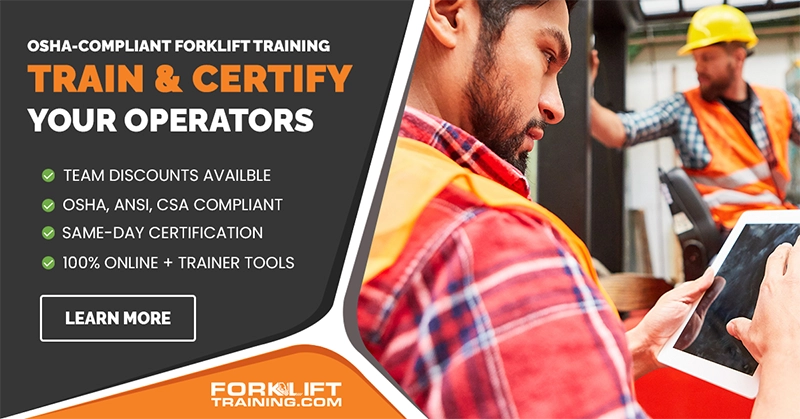OSHA Fines Trader Joe’s Over $200K for Forklift Safety Violations
The popular grocery chain Trader Joe’s received significant citations totaling $216,902 from the Occupational Safety and Health Administration (OSHA) for forklift safety violations following a December 2023 inspection at its location in Greenwood Village, Colorado.
The OSHA investigation uncovered serious violations related to unsafe forklift operations, including a lack of adequate forklift training for operators and a failure to inspect forklifts.
Unfortunately, Trader Joe’s had been cited for violating these same OSHA standards in three previous inspections across Pennsylvania, Maine, and Massachusetts.
The company also faced citations for repeatedly blocking electrical equipment, a safety hazard previously identified in Maine, New York, and New Jersey.
Employers must comply with all federal safety standards, including forklift safety training and keeping areas around electrical equipment clear to help prevent serious injuries and fatal incidents,” explained OSHA Area Director Chad Vivian in Englewood, Colorado. “We will continue to cite companies that fail to implement the measures necessary to protect their employees from these hazards.
The Importance of Forklift Training
While essential to many business operations, forklifts can pose a significant risk of incidents when not operated safely. Injuries can range from minor to life-altering, even leading to fatalities.
Thorough forklift operator training is crucial to minimize these risks and ensure worker safety and OSHA compliance. Proper training provides operators with the knowledge and skills necessary for safe operation.
This includes:
Understanding the different types of forklifts and their load capacities: Not all forklifts are created equal, and operators need to know the weight limits and operating characteristics of the specific equipment they’ll use.
Safe lifting, lowering, and load-carrying procedures: Proper load stability and securement for transport are essential to prevent tipping, falling objects, crushing incidents, and forklift collisions.
Navigating the workplace environment, including identifying hazards: Operators need to be aware of traffic patterns, blind spots, inclines, potential overhead hazards, and other potential dangers and adjust their operation accordingly.
Routine forklift inspection and maintenance: Operators should be able to identify basic safety issues with the equipment and know when to report problems for professional maintenance to prevent malfunction-related accidents.
OSHA Forklift Training Requirements
OSHA recognizes the hazards of improper forklift operation and mandates specific forklift operator training via standard 29 CFR 1910.178(l).
The Powered Industrial Truck Standard indicates that workers who operate powered industrial trucks such as forklifts, telehandlers, and pallet jacks, just name a few, must complete two separate training phases of training that include the following:
General Training Phase
General training covers forklift fundamentals, safety, and theory.
The general training is basically the classroom portion of the training that we’re all familiar with. This can be completed via online forklift training or in a traditional instructor-led classroom setting.
Workplace and Equipment-Specific Training Phase
The workplace-specific training is completed in your workplace using the specific equipment your operator will be working with.
Each of these two phases must conclude with an evaluation or assessment that confirms the operator is competent and can safely operate the equipment.
Evaluation and Re-Training
OSHA also mandates that forklift operator training isn’t a one-time event.
To ensure continued competency and safe operation, operators must undergo re-evaluation every three years. This re-evaluation can involve a combination of classroom refreshers, practical skills assessments, and observation of the operator performing their job duties within the workplace environment.
By incorporating regular re-evaluations and retraining, businesses can ensure their forklift operators stay up-to-date on safety protocols, identify any areas needing improvement, and maintain a safe working environment for everyone.
Conclusion
The Trader Joe’s case highlights the financial and reputational repercussions that companies can face if they do not ensure that forklift safety and training programs are implemented effectively.
Non-compliance with OSHA regulations can result in hefty fines, but more importantly, it risks serious injuries or even loss of life. Beyond the moral imperative, workplace accidents can damage goods, disrupt productivity, negatively impact employee morale, and tarnish a company’s reputation.
Investing in comprehensive forklift training is not just a legal obligation but a wise investment to protect your workers, your business, and the public.
Let’s make forklift safety a top priority in every workplace.


